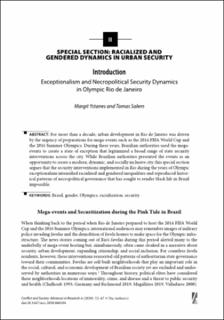| dc.contributor.author | Ystanes, Margit | |
| dc.contributor.author | Salem, Tomas | |
| dc.date.accessioned | 2022-12-01T11:16:13Z | |
| dc.date.available | 2022-12-01T11:16:13Z | |
| dc.date.created | 2020-09-28T16:06:00Z | |
| dc.date.issued | 2020 | |
| dc.identifier.citation | Conflict and Society - Advances in Research. 2020, 6 (1), 52-67. | |
| dc.identifier.issn | 2164-4543 | |
| dc.identifier.uri | https://hdl.handle.net/11250/3035291 | |
| dc.description.abstract | For more than a decade, urban development in Rio de Janeiro was driven by the urgency of preparations for mega-events such as the 2014 FIFA World Cup and the 2016 Summer Olympics. During these years, Brazilian authorities used the mega- events to create a state of exception that legitimized a broad range of state security interventions across the city. While Brazilian authorities presented the events as an opportunity to create a modern, dynamic, and socially inclusive city, this special section argues that the security interventions implemented in Rio during the years of Olympic exceptionalism intensified racialized and gendered inequalities and reproduced histor- ical patterns of necropolitical governance that has sought to render black life in Brazil impossible. | |
| dc.language.iso | eng | |
| dc.title | Introduction: Exceptionalism and necropolitical security dynamics in olympic Rio de Janeiro | |
| dc.type | Peer reviewed | |
| dc.type | Journal article | |
| dc.description.version | publishedVersion | |
| dc.description.version | publishedVersion | |
| dc.subject.nsi | VDP::Sosialantropologi: 250 | |
| dc.subject.nsi | VDP::Social anthropology: 250 | |
| dc.source.pagenumber | 52-67 | |
| dc.source.volume | 6 | |
| dc.source.journal | Conflict and Society - Advances in Research | |
| dc.source.issue | 1 | |
| dc.identifier.doi | 10.3167/ARCS.2020.060104 | |
| dc.identifier.cristin | 1834439 | |
| dc.relation.project | Norges forskningsråd: 220783 | |
| cristin.ispublished | true | |
| cristin.fulltext | original | |
| cristin.fulltext | original | |
| cristin.qualitycode | 1 | |
